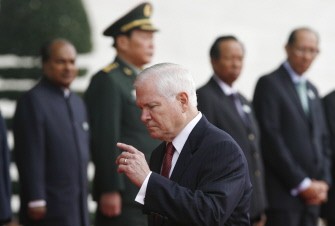HANOI, Oct 12, 2010 (AFP) - Territorial disputes in Asia-Pacific waters pose a threat to regional stability, US Defence Secretary Robert Gates warned Tuesday, but his Chinese counterpart said Beijing's growing military might was purely defensive.
China is involved in a series of long-running disagreements with countries in the region over strategically important or potentially resource-rich islands.

"Disagreements over territorial claims and the appropriate use of the maritime domain appear to be a growing challenge to regional stability and prosperity," Gates said, reflecting increasing friction with China.
In a statement to inaugural talks in Hanoi by regional defence ministers -- including China's Liang Guanglie -- Gates endorsed an international approach to solving maritime disagreements.
Beijing opposes this, but Gates said the US Navy would not back away from sailing into Pacific waters.
Ministers were seated around a rectangular table in an alphabetical arrangement that left Gates and Liang roughly facing each other.
China has adopted a more assertive stance as it expands its naval reach with new ships and submarines. It has also complained about US warships sailing in the South China Sea and conducting joint exercises with South Korea in the Yellow Sea.
While he stopped short of direct criticism of China, Gates' words underscored mounting rivalry as Beijing flexes its newfound military and economic might in a region long dominated by the United States.
Liang told the meeting: "China's defence development is not aimed to challenge or threaten anyone, but to ensure its security and promote international and regional peace and stability."
He said China had made a "strategic decision" for long-term peaceful development.
"China pursues a defence policy that is defensive in nature," Liang said, endorsing the aims of the new defence ministers' forum led by the Association of Southeast Asian Nations (ASEAN), which emphasises consensus-building.
"China is positive and open to regional security cooperation and supports ASEAN centrality" in the new forum, the highest-level regional defence talks ever held, he said.
A major source of friction in the region is the Paracel and Spratly archipelagos which straddle busy shipping lanes and are claimed by China, as well as Vietnam, Taiwan, Malaysia, Brunei and the Philippines, either in whole or in part.
China favours a bilateral approach in dealing with individual claimants, but ASEAN nations have taken a united stand.
Washington did not take sides in the disputes but "competing claims should be settled peacefully, without force or coercion, through collaborative diplomatic processes," and under international law, Gates said.
Restating US policy, Gates praised ASEAN members for trying to agree on a "code of conduct" for the South China Sea and said "we stand ready to help facilitate such initiatives."
ASEAN members proposed that the forum focus on counter-terrorism, disaster relief, maritime security, military medicine and peacekeeping -- a formula which Liang said "demonstrates the spirit of pragmatism".
The talks were the first-ever between the 10 ASEAN defence ministers and eight regional partners: Australia, China, India, Japan, New Zealand, Russia, South Korea and the United States.
The regional meeting followed efforts by Washington and Tokyo in talks on Monday to improve fragile military ties with China.
Beijing broke off military ties with Washington in January over American plans to sell Taiwan more than six billion dollars' worth of arms including Patriot missiles.







)
















